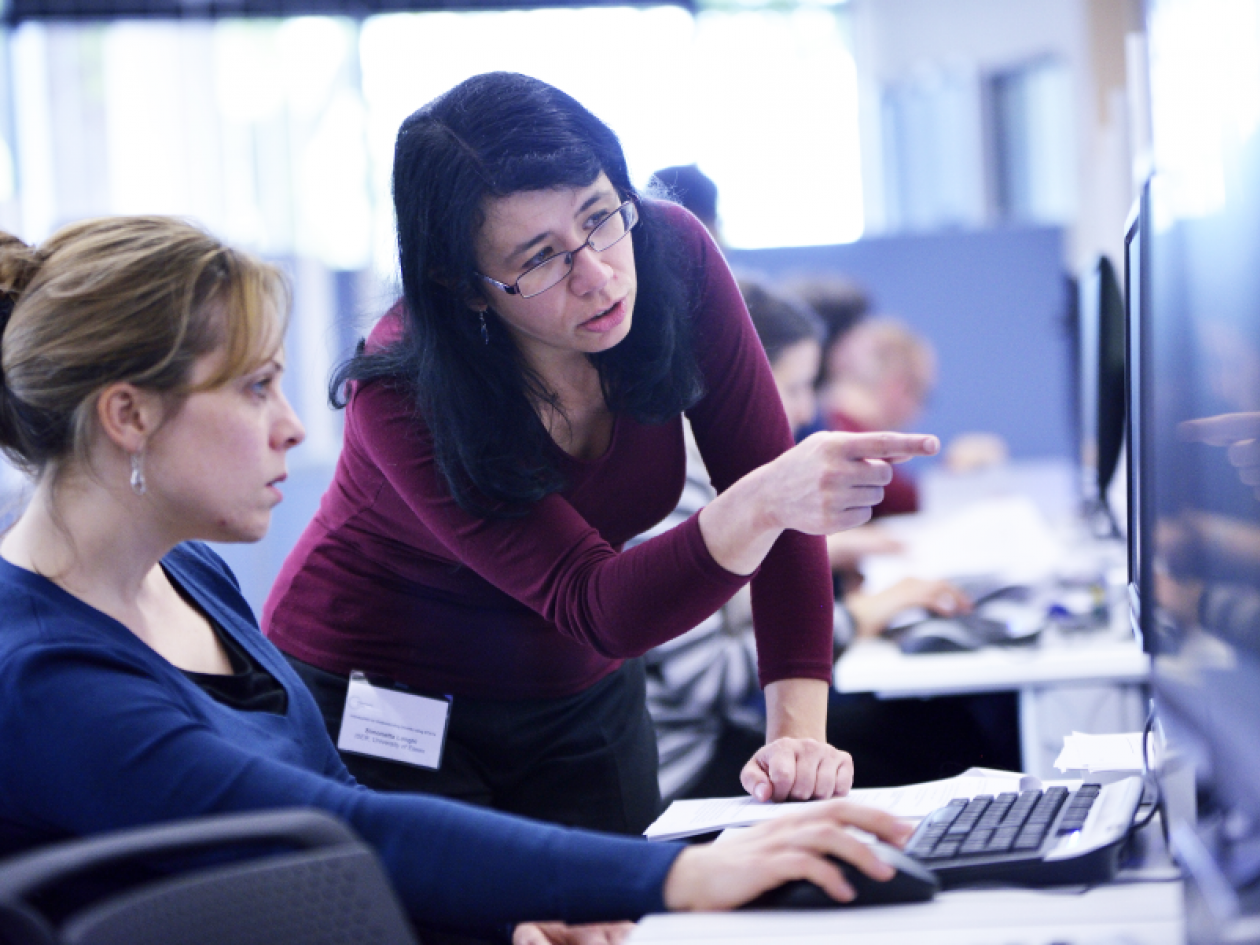At the University of Essex, where Understanding Society is based, the Albert Sloman Library is having a two-week focus on data – and data citation in particular.
Not only is it important to credit people for their work, but citations also help data sources like Understanding Society to show our funders we’re delivering value. To illustrate the point, here are some examples of the impact citing data and acknowledging people’s contributions can have.
Credit where credit’s due
You’ve probably heard of Rosalind Franklin now, whose ‘photo 51’ – an x-ray diffraction picture of a DNA molecule – helped to create the Nobel prize-winning model of the DNA double helix in 1953, but for years after her early death she was all but unknown. That might not have been the case if she’d published her findings before James Watson and Francis Crick, but they’d seen some of her unpublished data without her knowledge, which helped them finish their model. Their papers went out in the same edition of Nature, and when Crick, Watson and Maurice Wilkins got their Nobel prize in 1962 for this and later work, Crick didn’t mention her in his speech.
For most of us, Jocelyn Bell Burnell’s is an even less familiar name. Her work on pulsars won the 1974 Nobel Prize in physics… but not for her. She was the first person to observe pulsars, a type of neutron star that emits a beam of radiation, but was a postgrad student at the time, so her supervisor Antony Hewish got the gong. He always acknowledged her contribution, however, and mentioned her in his Nobel lecture – and Jocelyn Bell Burnell later said “it would demean Nobel Prizes if they were awarded to research students, except in very exceptional cases, and I do not believe this is one of them”.
(And if you think that was decent of her: when she got a $3m ‘breakthrough’ award in 2018, she declared she didn’t need the money and would use the winnings to fund women, under-represented ethnic minorities and refugee students to become physics researchers.)
Truth and lies
Moving on to another way of crediting sources… it’s tempting to think of attributing quotes correctly as pedantry, but if someone tells you that Voltaire said “I disapprove of what you say, but I will defend to the death your right to say it”, it’s a test of their expertise on the subject. They’re actually the words of Evelyn Beatrice Hall (under the pseudonym S. G. Tallentyre) in her 1906 work The Friends of Voltaire. She’s using the phrase to illustrate Voltaire’s beliefs – and possibly to help you at your next pub quiz.
Or, on a subject close to our hearts, who was it who first said, “There are three kinds of lies: lies, damned lies, and statistics?” Mark Twain? Disraeli? Walter Bagehot? Or none of them? It seems it may have begun as a riff on a 19th century court report when a barrister told his client “there were three sorts of liars, the common or garden liar … the damnable liar who is fortunately rather a rara avis [rare bird] in decent society, and lastly the expert” and evolved from there.
(We’d like to argue, though, that citing data sources correctly could be a way of defusing such cynicism.)
Give unto Thatcher the things that are Thatcher’s
While we’re on quotes, Margaret Thatcher was supposed to have observed that “Anybody over the age of 30 seen in a bus has been a failure in life”, but the historian Hugo Vickers says it was “Brian Howard, aesthete of the Brideshead generation” who first said it. “I know this because I congratulated Loelia, Duchess of Westminster on having coined the phrase in a small private anthology she published. She confessed she had nicked it from Howard. I think of it every time I get on a bus.”
Thatcher was also credited with winning the 1983 election by fighting the Falklands War, but that wasn’t true, either. David Sanders at the University of Essex and his co-authors, used a great deal of data to show that it was actually the Chancellor of the Exchequer’s doing. “The Falklands crisis merely coincided with a jump in government popularity which would have occurred anyway in the wake of Geoffrey Howe’s 1982 Budget.”
Really big lies
On a more serious note, there are times when data citation would have helped to protect facts from people who would prefer to play a little fast and loose with them.
Michael LaCour, a postgraduate student at UCLA, published a paper in Science in 2014 with Donald Green, a highly respected political science professor at Columbia, which flew in the face of conventional wisdom. Most research of people’s political views shows that we cling to our beliefs, and that if someone persuades us of something different, we quickly revert. This paper showed that a canvasser visiting voters’ homes could have a substantial and lasting effect on people’s views on marriage equality if they revealed that they were gay during the conversation. They had apparently carried out separate online surveys before and after the conversation. It was withdrawn when two postgrads at Stanford produced a report showing that “the dataset was not collected as described”. As Slate put it (less diplomatically), LaCour “took a preexisting dataset, pawned it off as his own, and faked the persuasion “effects” of the canvassing”.
Two years later, another article in Science apparently showed that fish larvae preferred microplastic particles to their natural food. It was covered widely in the media, and helped to make the case for banning microbeads in cosmetics. But other researchers in the field said the experiments as described couldn’t have taken place, the correct ethical approval for animal experimentation had not been obtained, and raw data were missing. The article was retracted in May 2017.
Cite your data!
So you see, citation really is important. It shows exactly which data underpinned your research. It allows other researchers to replicate and test your results, increasing the credibility of your work. It gives you a permanent link to the data through the Digital Object Identifier (DOI).
In our case, proving to our funders that our data is being used and having impact is pretty handy, too. If you use Understanding Society, we’d be very happy if you could get these words (or a version of them, depending on what dataset you’re using) into your reference list somewhere:
University of Essex, Institute for Social and Economic Research (2022). Understanding Society: Waves 1-11. 2009-2020 and Harmonised BHPS: Waves 1-18, 1991-2009. [data collection]. 15th Edition. UK Data Service. SN:6614, http://doi.org/10.5255/UKDA-SN-6614-16.
Remember that you can always ask us any questions about Understanding Society datasets and how to cite them. Just contact our User Support team
Authors

Chris Coates
Chris is Research Impact and Project Manager at Understanding Society




